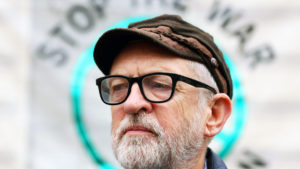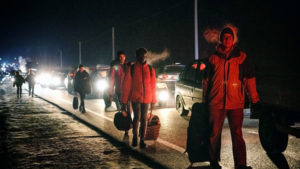Last week, Philip Bump of the Washington Post wrote a column about Fox News host Tucker Carlson’s coverage of the Russian invasion of Ukraine and referred, in passing and without elaboration, to “Right-wing pundit Glenn Greenwald”. The results were predictable. Greenwald’s defenders protested that he had previously supported the likes of Bernie Sanders, Jeremy Corbyn and Bolivia’s Evo Morales, doggedly opposed the last Bush administration, and used to write for the Guardian and the Intercept, which he co-founded.
His critics countered that he has not only severed all connections with Left-wing outlets but attacks them with vindictive ferocity, and can now be seen regularly on Carlson’s show, where they get along famously. I interpreted Bump’s description as a deadpan provocation, challenging the idea that Greenwald’s long-running identification with the Left matters more than what he now says and does. A bigger question, not new but intensified by the Ukraine crisis, is whether “Left” and “Right” are remotely adequate descriptions of the current political landscape.
I’m bemused by the idea of “the Left” as a unified, monolithic entity. (For this reason I don’t capitalise “Left” or “Right” except when it is a publication’s house style.) History supplies no evidence to support this notion of homogeneity. The Labour Party, for example, often feels like a marriage of convenience between people who hate each other. No Conservative can needle a Corbynite as much as a Blairite can, and vice versa. When I read some publications, “the Left” encompasses everyone from Joe Biden to a bearded millennial with a hammer-and-sickle in his Twitter handle, but then I turn to Twitter and see Owen Jones denouncing Paul Mason, an actual loud-and-proud Marxist, as a “neo-McCarthyite” and remember that the Left is diverse and fractious.
Responses to the invasion of Ukraine have been educational. Few western commentators are stupid enough to be explicitly pro-Putin but a significant number, including Greenwald and Carlson, are anti-anti-Putin. You can identify them by their obsession with Nato, “legitimate security concerns”, “poking the Russian bear”, the Azov battalion, and hypothetical biological warfare laboratories, all of which are popular Kremlin talking points. Their arguments usually begin with some throat-clearing variation on: “The invasion of Ukraine is abhorrent but…”
Some of them were once associated with the Left but now occupy a more chaotic space: former Democratic congresswoman Tulsi Gabbard, former Labour MP George Galloway, former comedian Russell Brand and former Rolling Stone journalist Matt Taibbi. (This is the world of the former.) Some, like Carlson, JD Vance, Nigel Farage and Steve Bannon, are clearly on the Right, if not the far-Right.
Some appear to be nothing more than contrarian narcissists who trade as “free-thinkers”. Others, who can be found in varying proportions in organisations such as the Stop the War Coalition, Democratic Socialists of America and Young Labour, come to anti-anti-Putinism via the far-Left. It will not surprise you to learn that many of the above made regular appearances on the now-banned Russian television channel RT.
Owen Jones gets into trouble because he insists on describing marginal groups as “the Left” and springing up to defend their honour. When the Labour leadership demanded that 11 MPs withdraw their signatures from a Stop the War statement, Jones decried it as “an excuse to purge the Left” — even though those 11 constituted about 5% of the PLP and one-third of the Socialist Campaign Group. Either the Left is a major political force with popular support for its policies, or it is a fringe of the fringe. Which is it?
The idea of a Left-Right spectrum originated with a seating arrangement. After the French Revolution, members of the new National Assembly who supported the king gathered to the president’s right and revolutionaries to the left. “Left” and “Right” caught on in Britain during the Spanish Civil War, which at the very same time exposed how inadequate those definitions were. Writers such as George Orwell and Franz Borkenau observed with horror that Stalinists in Spain murdered and defamed socialists and anarchists, employing tactics similar to those of the fascists they were fighting. The study of totalitarianism developed from those early efforts to explain the puzzling kinship between mortal enemies on the far-Left and the far-Right.
During the Forties, the likes of Orwell, Edmund Wilson, Andre Gide and Albert Camus became known as the “Non-Communist Left”. To them, the difference between Stalinism and democratic socialism was night and day — Clement Attlee suspended five Labour MPs for pro-Soviet sympathies — but this fundamental divide in the Left often confused conservatives. When the Duchess of Atholl, impressed by the anticommunism of Animal Farm, invited Orwell to address the Right-wing League for European Freedom, he wrote back: “I belong to the Left and must work inside it, much as I hate Russian totalitarianism and its poisonous influence on this country.” In the early Sixties, rejection of Soviet communism was one of the founding principles of the New Left, even if many of its members went on to mimic the error by lionising Mao.
Despite these major fractures, Left and Right were useful labels so long as economics and class interest dominated politics. Party policies on tax and welfare may still cleave that way but voting behaviour does not. People regularly vote against their class interests, prioritising cultural values and identity over economics. If you hadn’t noticed before 2016 that parties of the Left were becoming, relatively speaking, more middle-class and parties of the Right more working-class, then Brexit and Trump made it unignorable. In the UK, while Labour broadly leaned towards Remain and the Tories towards Brexit, there were enough Thatcherite Remainers and socialist Leavers to create unlikely new alliances. (Then again, in the Seventies, the two most prominent Eurosceptic MPs were Tony Benn and Enoch Powell. Europe has that effect.)
Strange bedfellows have been a growing feature of the past decade in what we generally call populist movements even when they’re not popular. When it comes to anti-vaxxers, the gilets jaunes in France, or people who spread conspiracy theories about the White Helmets in Syria, it can be almost impossible to tell whether the person talking is on the far-Left, far-Right or has no coherent ideology at all. The rise of identity politics has fractured the Left, too. There are Marxists who reject it outright and socialists who gravitate towards the socially conservative Blue Labour. The language of politics has not yet caught up.
The anti-anti-Putin Left are most usefully described as “campists”, whose geopolitical philosophy is summed up by the phrase “the enemy of my enemy is my friend”. America is the font of all evil, therefore its opponents must have something going for them.
The British-Syrian writer Leila Al-Shami calls this “the anti-imperialism of idiots”: “This pro-fascist Left seems blind to any form of imperialism that is non-western in origin. It combines identity politics with egoism. Everything that happens is viewed through the prism of what it means for westerners — only white men have the power to make history.” Russia’s unprovoked war of imperialist aggression is as inconvenient to campists as China’s oppression of the Uyghurs. Either they must find a way to blame America after all or they must downplay the issue. Left-wing support for corrupt authoritarians such as Venezuela’s Nicolas Maduro and Nicaragua’s Daniel Ortega is disappointing enough, but sympathy with Vladimir Putin, Bashir al-Assad and Xi Jinping is symptomatic of a morally broken worldview.
At the risk of sounding like Walter in The Big Lebowski — “Say what you want about the tenets of National Socialism, Dude, at least it’s an ethos” — old-fashioned Stalinism had a certain logic. The USSR was for a long time the world’s only socialist country, and many people believed that if socialism failed there, it would fail completely. So they shut their eyes and ears to the show trials, the purges, the gulags, the Holodomor and so on, until the denial became intolerable. Malcolm Muggeridge compared the British human-rights activists who whitewashed Stalin’s Russia to “vegetarians undertaking a pious pilgrimage to a slaughter-house because it displayed a notice recommending nut cutlets”.
Campists don’t even need the advertisement for nut cutlets, because they do not know what they stand for, only what they oppose. This is how you end up making excuses for dictators who bomb hospitals while demonising the people who pull the bodies from the rubble as terrorists and/or CIA assets. This is how people who define themselves by their opposition to the US invasion of Iraq find themselves claiming that Russia was provoked into invading Ukraine. It is obscene.
The French philosopher Jean-Pierre Faye popularised the Horseshoe Theory, which argues that the extremes of Left and Right curve towards one another rather than sitting at opposite ends of a straight line. Hotly disputed by people who consider it a “smear” on the Left, it has the drawbacks of simplicity as well as the benefits. It does not mean that the far-Left are no different from fascists, any more than Stalin was a Nazi. I see it as an observation rather than an ironclad prescription. I know people far to my Left whose moral and intellectual integrity is unimpeachable, but I’ve also encountered antisemites, Assadists and Putin apologists who claim to be socialists. Another term for this, again harking back to the Thirties, is “red-brown alliance”.
Back in 2009, Michelle Goldberg observed that Infowars host Alex Jones occupied “the shadowy territory where the far-Right curves around and meets the far-Left”. The invasion of Ukraine has made the existence of this tendency undeniable. Last week, Iranian state television broadcast a conversation between suspended Labour MP Chris Williamson, sacked university professor David Miller and prominent Stop the War member Lowkey about alleged Zionist influence in Ukraine. However that confederation of ghouls might define itself, it does not represent any Left that I identify with. Yet you can see for yourself how many influential people on the Left rallied to the defence of Williamson and Miller over allegations of antisemitism not so long ago.
In Britain, Left-wing writers such as Paul Mason, George Monbiot and Daniel Randall have long been fierce critics of campism. In recent weeks, Leftists from Ukraine and Syria have denounced it, too, while the Polish group Left Together has withdrawn from Yanis Varoufakis’s DiEM25 and the dubiously named Progressive International for their both-sides framing of the invasion. “You, decades after the Eastern European version of communism collapsed and Russia turned into a turbocapitalist, authoritarian regime, are still claiming that the man in charge of it is some kind of ‘anti-imperialist’ hero, despite him doing pretty much all he can to assure his stated aim of rebuilding the Russian empire and beyond,” wrote Zosia Brom in a furious piece called “Fuck leftist westplaining”. They have had enough of this nonsense, and who can blame them?
We are currently experiencing a moment of rare political unity on the subject of Putin and Ukraine, which makes the spectrum-scrambling dynamics of anti-anti-Putinism brutally clear. The Left-Right axis became popular because it helped to clarify existing political positions but now it obscures reality so frequently that I wonder we are so addicted to an archaic binary. Whether someone describes themselves as Left-wing or Right-wing no longer interests me. The only thing that matters is what they’re actually saying.
Disclaimer
Some of the posts we share are controversial and we do not necessarily agree with them in the whole extend. Sometimes we agree with the content or part of it but we do not agree with the narration or language. Nevertheless we find them somehow interesting, valuable and/or informative or we share them, because we strongly believe in freedom of speech, free press and journalism. We strongly encourage you to have a critical approach to all the content, do your own research and analysis to build your own opinion.
We would be glad to have your feedback.
Source: UnHerd Read the original article here: https://unherd.com




